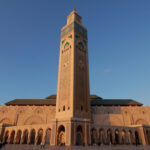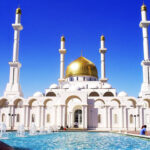Tasawwuf.
Tasawwuf stands for purification. According to the Holy Quran, the purpose of Islam is that: “Allah wishes to remove from you all uncleanliness, and He will purify you a complete purifying. ” Abu Bakr was a pure soul, and he had all the attributes, which are the sine qua non of Tasawwuf.
Junaid.
Abu Bakr was the first person to give instructions about the reciting of the sacred Kalimah as a means for purification of the heart. According to Junaid, a prominent Sufi of Baghdad, the noblest saying about ‘unification’ is that of Abu Bakr who said: “Glory to God who has not vouchsafed to His creatures any means of attaining knowledge of Him except through impotence to attaining such knowledge”. The implication is that Ijz or helplessness is the only way of attaining the knowledge of God. The test of learning is that one should have the feeling that he has yet much to learn.”
Imam of the Sufis.
Ali Hajveri has stated in his classic work Kashful Mah jub, that Abu Bakr is the Imam of the Sufis. Most of the Sufi orders originate with Ali, but the Naqshbandi order originates with Abu Bakr who is regarded as the first person to perceive the truth about Sufism.
The Sufis maintain that Abu Bakr rose to the highest stage of Tasawwuf, and that he had some of the qualities that characterized the Prophet Abraham. The Holy Quran confers on Abraham the title of Awwah, one who sighs much, and this was the name by which Abu Bakr was known among his companions.
Abu Bakr would often sigh and say, “I wish I were a bird”, or “I wish I were a tree”, or again “I wish I were a hair on the body of a Momin”. On seeing a bird perched on the branch of a tree, Abu Bakr would heave a sigh and say, “O bird you are happy. You eat of the fruits of the tree, and live under its shadow. You have no fear of rendering accounts. How I wish I had been in a position similar to yours”.
Sufic thought of Abu Bakr.
Abu Bakr said: “Our abode in this world is transitory. Our life therein is but a loan. Our breaths are numbered, and our indolence is manifest. “
According to Abu Bakr’s way of thinking, the world is too worthless to engage our thoughts for whenever you occupy yourself with what is perishable, you are made blind to what is eternal. This is obviously the thought of a Master Sufi.
Philosophy of the life of Abu Bakr.
According to Ali Hajveri the approach of a Sufi is as follows: “O God give me plenty of the world, and make me desirous of renouncing it. First bestow on me goods that I may give thanks for them, and then help me to abstain from them for Your sake so that I may have the treble merit of thanksgiving, liberality and abstinence, and that my poverty may be voluntary, not compulsory.”
This was the basic approach of Abu Bakr as well. By hard work and labor he amassed considerable wealth, and then spent it entirely in the way of Allah. Abu Bakr led the life of a poor man, but he was not poor in the sense that he had no money; he was poor only in the sense that he had no desire for money.
Poverty in his case was not compulsory it was voluntary. In the case of a person who has no resources, poverty is compulsory. On the other hand, a person who has enough of money but prefers to live like a poor man takes over to poverty in a voluntary way. Abu Bakr’s life was a striking example of preferring voluntary poverty to compulsory poverty in the Sufi way.
Apogee of Tasawwuf.
According to a well-known anecdote, the Holy Prophet invited contribution from the Muslims for financing the expedition to Tabuk. In response to the invitation Umar brought a considerable portion of his wealth. As he came loaded with the contribution, Umar thought that day he would surpass Abu Bakr in the matter of service to Islam.
The Holy Prophet was very happy to receive the contribution from Umar. “Have you left anything for yourself” asked the Holy Prophet, and Umar replied, ” I have left one half for myself. Then Abu Bakr came with his contribution, and when the Holy Prophet put him the same question he promptly replied, “I have brought all I had, I have left Allah and His Prophet for myself and my dependents. ” This approach marks the apogee of Tasawwuf.
Fear of God.
The main plank of Sufism is fear of God. Throughout his life, Abu Bakr was guided by the principle of the fear of God. As the caliph, he enjoined all the functionaries of the State to fear God. It is on record that when offering prayers the fear of God would so overwhelm Abu Bakr that he would look like a stick of dry wood.
Abu Bakr’s Prayer.
The usual prayer of Abu Bakr was: “O Allah You know me better than I do; And I know myself better than the people, O Allah make me better than what the people think of me, and forgive me for the sins which the people do not know, and do not call me to account for what the people say about me.” It is the typical prayer of a Sufi.
Equation between man and God. When the Holy Prophet died, and the people would not believe that he was dead, Abu Bakr said: “Whoever worshipped Muhammad, let him know that Muhammad is dead, but whoever worships the God of Muhammad, let him know that He lives and dies not.” This classic quotation which has passed into history is an embodiment of the highest values of Islam and Sufism. It sets an equation between man and God, and it cannot be put in more meaningful words than what Abu Bakr did. That is the most consummate thought of a Sufi.
Abu Bakr’s way of Sufism.
According to Data Ganj Bakhsh, Abu Bakr’s way of Sufism was the contemplative way as compared to the purgative way of Umar. When Abu Bakr prayed he recited the Holy Quran in a low voice, while Umar recited the Holy Quran in a loud voice.
When the Holy Prophet asked Umar the reason for his reciting the Holy Quran in a loud voice he said “I wake the drowsy and drive away the devil.” When Abu Bakr was asked to explain why he recited the Holy Quran in a low voice, he said, “He with whom I converse will hear.” With Abu Bakr the recitation of the Holy Quran was the means of communion with God and that was the Sufi way.
Father of Tasawwuf.
Tasawwuf is the way of truth. Tasawwuf implies that a Sufi should be assiduous in piety. It also means that one should give up all else for God’s sake. The keynote of Tasawwuf is selfless devotion. If we study the attributes of Abu Bakr, we are struck by the fact that all the attributes that go to make a Sufi were very conspicuous with Abu Bakr.
He was “Siddiq” endowed with the vision to perceive that truth. He was most assiduous in piety. He gave away all his wealth for God’s sake. He was selfless. When he became the Caliph he stated on oath that he had never coveted the office. Abu Bakr was the symbol of selflessness among the companions of the Holy Prophet. His devotion and dedication to Allah, His Prophet, and lslam were of the highest order, and no other companion of the Holy Prophet excelled him in that respect. No wonder Abu Bakr is the “Father of Tasawwuf”.
Visits: 0




















